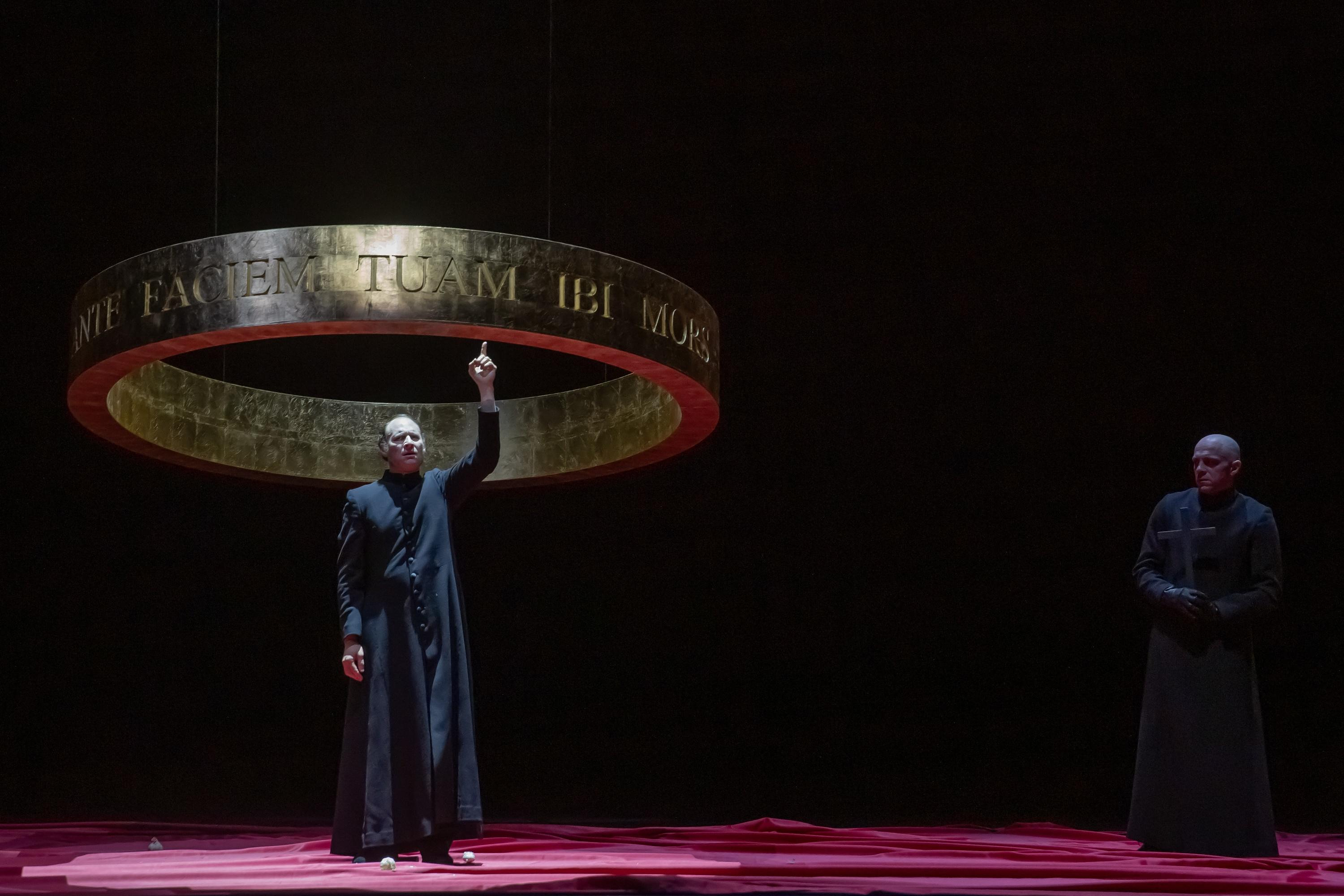About Macbeth, Shakespearean Stephen Greenblatt says this: “Nearly fifteen years after writing Richard III, Shakespeare returned to his vision of the evil personality who is both the engine and the burden of tyrannical power. Smeared in blood from the treacherous assassination of King Duncan to his pitiful and desperate end, Macbeth is Shakespeare's best-known and most memorable tyrant. » But Macbeth has the reputation of being one of the most difficult plays to stage, of even being unperformable, according to some, and the spectator, dazzled by the memory of an explosive reading, often only experiences disappointment. after the performance. Worse, this tragedy is said to bring bad luck. What about Silvia Costa's Comédie-Française adaptation starring Noam Morgensztern in the title role and his crazy wife Julie Sicard in the title role?
There she is, the crazy Lady Macbeth in a red dress in front of the lowered curtain, sitting on a chair, red hair covering her face as the audience settles into the Richelieu room. Above the crazy ambitious woman - her hands seem to suffer from disturbing nervous tics - a painting representing her general husband suddenly begins to spin like a windmill. The portrait will soon be lacerated with premonitory stab wounds. Lady Macbeth tears tufts from her wig, stands up and declares, speaking of her cowardly husband: “You are earl of Glamis and Cawdor, and you will also be what was predicted to you…” We hear voices. End of the first scene, which is actually the fifth.
Also read: William, by Stéphanie Hochet: Shakespeare and his intimate shadows
The red curtain rises; descending from the hangers is an imposing golden crown on which these few words are engraved: “Ante faciem tuam ibi mors” (“before your face, there is death”). This Macbeth will be played out in an atmosphere of almost traditional Catholic austerity. Then enters, with a slow step, the King of Scotland, Duncan (Alain Lenglet, who, always, imposes), dressed in a Victorian style dress. It seems statuary, already embalmed. The Witches (the fatal sisters played by Suliane Brahim, Birame Ba and the incredible and hilarious Jennifer Decker) arrive from the right pushing a wheel reminiscent of the one used for torture. Three white shirts hang there. The wheel, like the painting at the beginning, begins to turn: a stunning impression of a flying ghost. This wheel is one of the best scenographic ideas of this show with the majestic and cold facade of a Gothic cathedral.
A twelve-tone musical background accompanies the entire show. Echoes of voices, children's cries, pin you to the chair. Lady Macbeth is the queen of crime and we wouldn't want to meet her on a moonless night. She knows her husband's nature well, "too full of the milk of human tenderness", and fears that this coward lacks that pair of cojones which befits a true tyrant. Noam Morgensztern – who, at first, wears the cassock! - embodies a Macbeth full of sexual anxieties, sometimes reduced to an infant who demands his pacifier, who cries in the skirts of his nurturing wife. But when he commits one crime after another - the murder of his old friend Banquo (Clément Bresson) frees him from his helplessness - Macbeth, who has become paranoid, is a master in the art of deception. From this key moment, Morgensztern finally gives everything he has in his stomach. As for Lord Macduff (Pierre Louis-Calixte, Christ-like face), he is dressed in the white robe of the messiah. Born by Caesarean section, Macduff will have the head of Macbeth, a tyrant condemned from the start.
Also read: William Shakespeare: his kingdom for a series
This tragedy, one of the most spirited, effervescent plays - one of the shortest, too - by Shakespeare, seriously lacks, under the direction of Silvia Costa, nerve. His abstract and confused vision lacks rhythm, gets lost in the paths of an obscure forest. We have the sad impression that the bard's text, of insolent perfection (excellent translation by Yves Bonnefoy), exceeds the director's project and, by trickling down, bogs down the actors - despite a few pieces of bravery by Julie Sicard when she definitely loses it.
If the human condition is the source of an intolerable claustrophobia, then this production under Lexomil has royally achieved its goal, but has in no way satisfied our desire which was to (re)immerse ourselves in this world full of noise and fury sung by Shakespeare, the greatest poet of our times of distress.
Macbeth. At the Comédie-Française, until July 20. Tel.: 01 44 58 15 15.

 What is chloropicrin, the chemical agent that Washington accuses Moscow of using in Ukraine?
What is chloropicrin, the chemical agent that Washington accuses Moscow of using in Ukraine? Poland, big winner of European enlargement
Poland, big winner of European enlargement In Israel, step-by-step negotiations for a ceasefire in the Gaza Strip
In Israel, step-by-step negotiations for a ceasefire in the Gaza Strip BBVA ADRs fall almost 2% on Wall Street
BBVA ADRs fall almost 2% on Wall Street Children born thanks to PMA do not have more cancers than others
Children born thanks to PMA do not have more cancers than others Breast cancer: less than one in two French women follow screening recommendations
Breast cancer: less than one in two French women follow screening recommendations “Dazzling” symptoms, 5,000 deaths per year, non-existent vaccine... What is Lassa fever, a case of which has been identified in Île-de-France?
“Dazzling” symptoms, 5,000 deaths per year, non-existent vaccine... What is Lassa fever, a case of which has been identified in Île-de-France? Sánchez cancels his agenda and considers resigning: "I need to stop and reflect"
Sánchez cancels his agenda and considers resigning: "I need to stop and reflect" “Amazon product tester”: the gendarmerie warns of this new kind of scam
“Amazon product tester”: the gendarmerie warns of this new kind of scam “Unjustified allegations”, “promotion of illicit products”… Half of the influencers controlled in 2023 caught by fraud repression
“Unjustified allegations”, “promotion of illicit products”… Half of the influencers controlled in 2023 caught by fraud repression Extension of the RER E: Gabriel Attal welcomes a “popular” ecology project
Extension of the RER E: Gabriel Attal welcomes a “popular” ecology project WeWork will close 8 of its 20 shared offices in France
WeWork will close 8 of its 20 shared offices in France “We were robbed of this dignity”: Paul Auster’s wife denounces the betrayal of a family friend
“We were robbed of this dignity”: Paul Auster’s wife denounces the betrayal of a family friend A masterclass for parents to fill in their gaps before Taylor Swift concerts
A masterclass for parents to fill in their gaps before Taylor Swift concerts Jean Reno publishes his first novel Emma on May 16
Jean Reno publishes his first novel Emma on May 16 Cannes Film Festival: Meryl Streep awarded an honorary Palme d’Or
Cannes Film Festival: Meryl Streep awarded an honorary Palme d’Or Omoda 7, another Chinese car that could be manufactured in Spain
Omoda 7, another Chinese car that could be manufactured in Spain BYD chooses CA Auto Bank as financial partner in Spain
BYD chooses CA Auto Bank as financial partner in Spain Tesla and Baidu sign key agreement to boost development of autonomous driving
Tesla and Baidu sign key agreement to boost development of autonomous driving Skoda Kodiaq 2024: a 'beast' plug-in hybrid SUV
Skoda Kodiaq 2024: a 'beast' plug-in hybrid SUV The home mortgage firm rises 3.8% in February and the average interest moderates to 3.33%
The home mortgage firm rises 3.8% in February and the average interest moderates to 3.33% This is how housing prices have changed in Spain in the last decade
This is how housing prices have changed in Spain in the last decade The home mortgage firm drops 10% in January and interest soars to 3.46%
The home mortgage firm drops 10% in January and interest soars to 3.46% The jewel of the Rocío de Nagüeles urbanization: a dream villa in Marbella
The jewel of the Rocío de Nagüeles urbanization: a dream villa in Marbella Europeans: a senior official on the National Rally list
Europeans: a senior official on the National Rally list Blockade of Sciences Po: the right denounces a “drift”, the government charges the rebels
Blockade of Sciences Po: the right denounces a “drift”, the government charges the rebels Even on a mission for NATO, the Charles-de-Gaulle remains under French control, Lecornu responds to Mélenchon
Even on a mission for NATO, the Charles-de-Gaulle remains under French control, Lecornu responds to Mélenchon “Deadly Europe”, “economic decline”, immigration… What to remember from Emmanuel Macron’s speech at the Sorbonne
“Deadly Europe”, “economic decline”, immigration… What to remember from Emmanuel Macron’s speech at the Sorbonne These French cities that will boycott the World Cup in Qatar
These French cities that will boycott the World Cup in Qatar Champions Cup: Toulouse with Flament and Kinghorn against Harlequins, Ramos replacing
Champions Cup: Toulouse with Flament and Kinghorn against Harlequins, Ramos replacing Tennis: still injured in the arm, Alcaraz withdraws from the Masters 1000 in Rome
Tennis: still injured in the arm, Alcaraz withdraws from the Masters 1000 in Rome Sailing: “Like a house that threatens to collapse”, Clarisse Crémer exhausted and in tears aboard her damaged boat
Sailing: “Like a house that threatens to collapse”, Clarisse Crémer exhausted and in tears aboard her damaged boat NBA: Patrick Beverley loses his temper and throws balls at Pacers fans
NBA: Patrick Beverley loses his temper and throws balls at Pacers fans


















